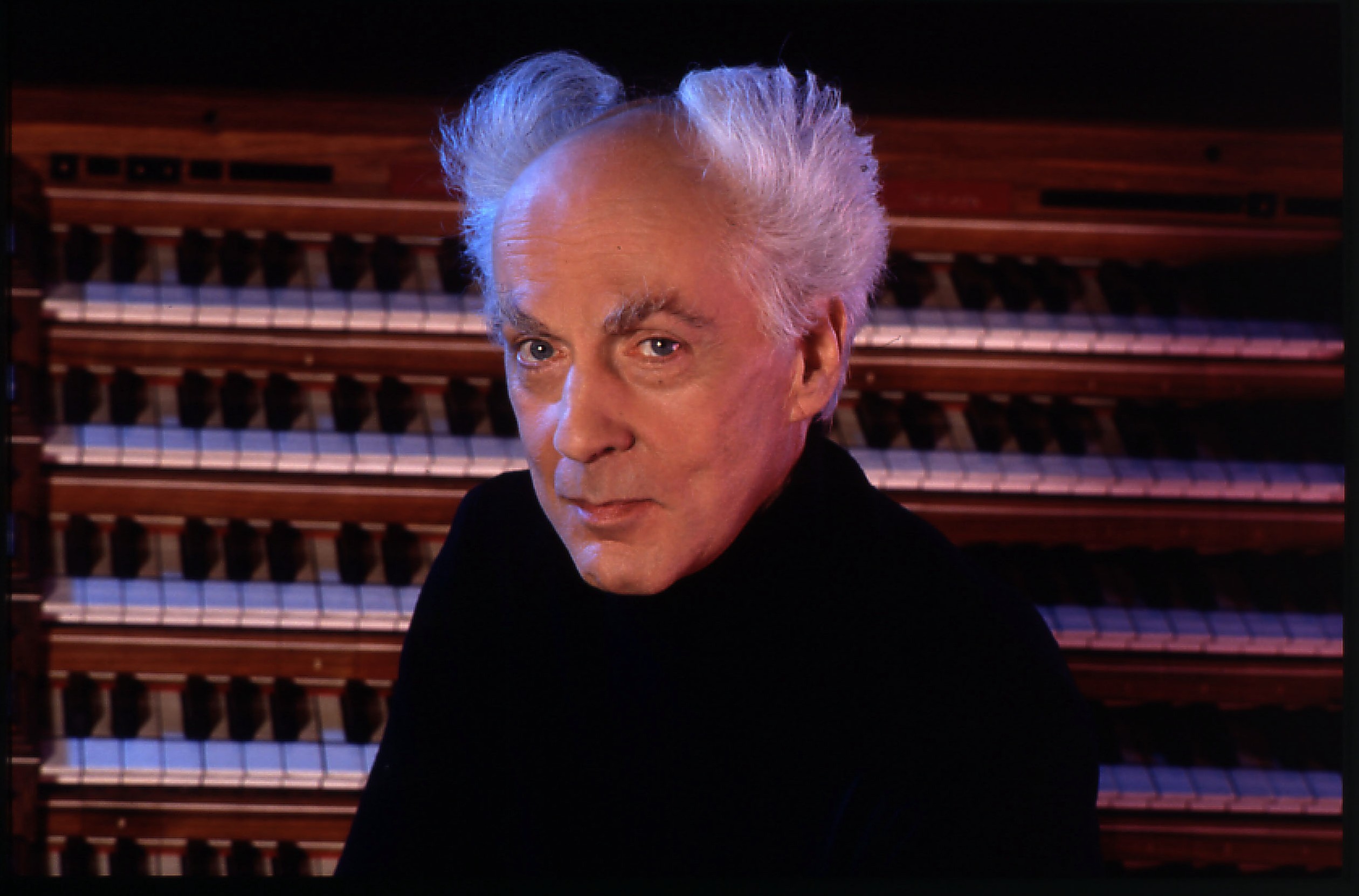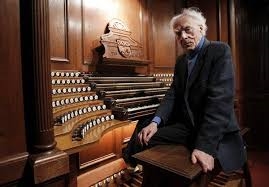18 April 1930 – 26 January 2019

The French organist Jean Victor Arthur Guillou died on Saturday 26 January 2019 at the age of 88. Titular organist at the Saint-Eustache Church in Paris for over fifty years, from 1963-2015, he led a triple career as a performer, a teacher and a composer. An international concert organist and pianist, a prodigious improviser, an imaginative composer, a poet and a writer, this creative genius totally consecrated his life to his Art.
Born in Angers on 18 April 1930, Jean Guillou taught himself how to play the piano at home. Fascinated by improvisation, he studied the organ with Raphaël Fumet. At the age of twelve, he was named organist at the local Saint-Serge Church. In 1947, he took private organ lessons in Paris with Rolande Falcinelli, thus becoming one of her first disciples. In 1953, he entered the Paris Conservatory and studied harmony with Maurice Duruflé, music analysis with Olivier Messiaen and organ with Marcel Dupré. In 1954, he was awarded First Prizes in organ, harmony, counterpoint and fugue.
Equipped with a solid technic, Jean Guillou expressed his vital inner imagination with ease, fluidity and brilliance. His clear, incisive sense of touch revealed the details of each piece with subtlety and refinement. His colorful registrations and visionary conceptions shined through his flamboyant interpretations, his transcriptions and his improvisations. Well known for his interpretations of Liszt, Mozart, Schumann, Mussorgsky, Franck and J. S. Bach (recorded by Philips), on June 1, 1982, the American Guild of Organists presented him the “International Performer of the Year” award during a recital he gave at the Riverside Church in New York City. In 1985, during the third centenary J. S. Bach’s birth, Jean Guillou performed the complete works of Bach in ten concerts, in France and in foreign countries. During his improvisations, notably at night, he shared his dreams with others.
From 1955 to 1957, Jean Guillou taught at the Escola Diocesana de Musica Sacra in Lisbon. He then lived in western Berlin. From 1970 to 2005, he gave masterclasses in Zurich, teaching interpretation and improvisation to over 300 organists from all over the world.
At the Sainte-Eustache Church in Paris, the organ had two consoles, one in the organ loft and another on the ground floor, where the organist was visible to everyone. Jean Guillou was assisted by a co-titular organist, André Fleury, by Jean-Paul Imbert and by his students. From 1977 to 1989, this organ underwent a series of disastrous restorations, until the Dutch firm Van den Heuvel entirely reconstructed it, maintaining Victor Baltard’s organ case. This new organ, with its 101 stops, was inaugurated on September 21, 1989.
With the German organ builder Detlef Kleuker, Jean Guillou designed the organs at the Notre-Dame des Neiges Church in Alpe d’Huez in France, at the Chant d’Oiseau Church in Brussels, at the Tonhalle in Zurich, at the Naples Conservatory and at the Tenerife Auditorium in Sante Cruz. In his book, L’Orgue, souvenir et avenir [The Organ, Past and Future] (Buchet-Chastel, 1978/Symétrie, 2010), Jean Guillou expressed his strong belief that organs should resound elsewhere than in churches. He conceived a portable organ with a variable structure that can be performed anywhere, even in the middle of a forest… In La Musique et le Geste [Music and Gesture] (Beauchesne, 2012), Jean Guillou explained his conception of music as a sonorous gesture. He even wrote a collection of poems entitled Le Visiteur [The Visitor] (Christophe Chomart, 2009).
In addition to his abundant production of organ works, Jean Guillou also made numerous transcriptions for organ and composed works for the organ with: piano, flute, trumpet, mixed choir, soprano, narrator, as well as seven concertos for organ and orchestra, chamber music and symphonies for large orchestra…, mostly published by Schott. Over 100 recordings were published by Philips, Dorien, Festivo…
Jean Guillou worked constantly and remained an active performing artist until the end of his life. In 2015, when he was forced to retire from Saint-Eustache, he wanted to designate his successor, but the church held a competition to name his two successors. In 2016, at the age of 86, he continued to give concerts (by memory, of course). On September 23, he played Liszt’s Ad nos at the Notre-Dame Cathedral in Paris. After giving concerts in Korea, on June 26, he performed on the historic Cavaillé-Coll at the Saint-Ouen Abbey Church in Rouen, where his former student, Jean-Baptiste Monnot, had just been appointed co-titular.
Thanks to Jean-Michel Franchet, President of the Organ Association in Melun (in the Seine-et-Marne, south of Paris) I was privileged to know Jean Guillou personally. He had invited both of us to celebrate the 25th anniversary of this association on October 15, 2016. We gave a day-long series of presentations on Pauline Viardot’s former house organ, built by Aristide Cavaillé-Coll in 1851 and installed in the Notre-Dame Collegiate Church in Melun in 1885. Since this was Cavaillé-Coll’s first organ to include a German pedal board with thirty notes and two independent pedal stops, we performed together Charles-Valentin Alkan’s Bombardo-Carillon for four feet on this occasion. Jean Guillou then gave an eclectic concert of works by Vivaldi/Bach, Franck, Guillou and Liszt. I remember his warm, friendly personality and his vigorous interpretations.
A great artist, may Jean Guillou rest in eternal peace and light, amidst the universal harmony that he shared with others during his life. Organists from all over the world will attend his funeral on Tuesday, February 5, at 2:30 p.m., at the Notre-Dame Cathedral in Paris, France. The Diapason presents its sincere sympathy to his wife, his daughter, his friends, his students and his colleagues.
Carolyn Shuster Fournier, Paris, France, January 30, 2019. With permission of The Diapason www.thediapason.com


